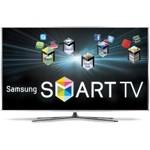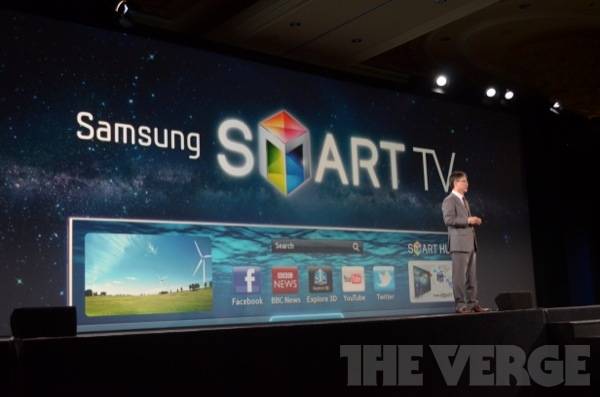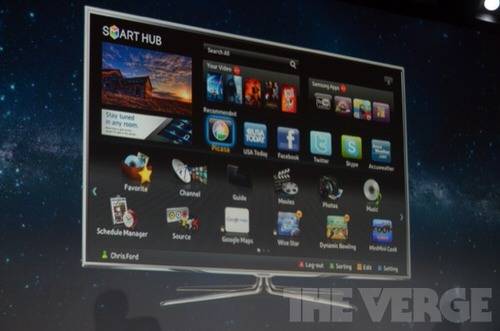It’s not even Day 1 at this year’s CES in Las Vegas, but already we’ve seen a flurry of product announcements. One of the more impressive was from Samsung. Internet TV is expected to be a big trend of 2012 and as the world’s number 1 TV brand, Samsung is a company to watch. Especially given the gains Samsung made over 2011 with the Galaxy series of smartphones and tablets, which made it the leading vendor of Android-based devices in the world.

The big news from Samsung today was a Smart TV push. The word “smart” here refers to Internet connectivity. Samsung’s 2012 model TVs will enable users to consume a mix of traditional TV programming and Web apps. It remains to be seen how well these new Internet features are implemented, because software and user experience have not historically been strengths of Samsung. But the message today was clear: Samsung is doubling down on its core TV leadership and attempting to make the TV the main household Internet device.
The official theme at Samsung’s CES event was “Pushing Boundaries.” Boo-Keun Yoon, president of the Samsung Consumer Electronics Division, told the CES crowd that Samsung aims to “break down the walls that exist between devices.”
Yoon began by noting that Samsung is the world’s number 1 TV brand, for the sixth consecutive year. It sold 1.7m TVs in the month of November. He then reiterated that the TV is its primary product and is a hub for all of its other consumer offerings. “While we may have many devices,” he remarked, “the heart of this ecosystem is the TV. The TV plays an important role in bringing family members together.”
This reminds me a bit of Microsoft’s strategy around the PC. Substitute a TV for the PC and you have Samsung’s Internet strategy.
Smart TV
Samsung announced today that it is upgrading its TV line with a bunch of “smart” features. Labeled “Smart TV,” 2012 model Samsung TVs will feature Smart Interaction, Smart Content, Smart Evolution and Smart Hub.

The idea behind Smart Interaction is to move beyond the traditional TV remote control. Now, viewers will be able to control their TV using face recognition, plus gesture and voice controls. It will be similar to how Microsoft’s Kinect works on XBox.
Smart Content introduces social services to Samsung’s TVs. Yes, this means apps. Yoon claimed that Samsung Smart TV is already “the leading platform for developers,” with 25,000 developers working on the platform. 20 million apps will have been downloaded by the end of this month, he said.
At CES, Samsung introduced some key apps for its platform. One is called Family Story and it allows you to upload photos, videos and memos from mobile devices to your TV. Voice chat is coming in the future. Also, as if to prove that it is a major player now in the Web ecosystem, Samsung announced that Angry Birds will become available on Samsung Smart TVs later this year.
Smart Evolution enables you to upgrade your TV with future functionality, without having to buy a new TV. Basically it is an upgrade slot at the back of the TV and you will be able to insert an “evolution kit” into it. This will be available for all 2012 and beyond TVs.
Smart Hub is a new UI for the Web features and is in HD. Also announced at CES was an upgrade to AllShare, Samsung’s cloud connectivity service. AllShare now includes sync for photos and video.

Along with the Smart TV strategy, Samsung announced new television models. These included the ES8000 LED HDTV and the so-called “ultimate TV,” a 55-inch Super OLED TV. These and other high-end TVs which Samsung releases will feature an integrated camera, for both video chat and the motion controls.
What about 3D, last year’s Big Thing at CES? Samsung hasn’t entirely de-focused from it. Although 3D failed to get much interest from consumers, this year Samsung will attempt to drive 3D content through streaming services.
Other Computing Devices
The TV may be Samsung’s main weapon, but it was Android-powered smartphones, tablets and laptops that propelled the company to the top rung of Internet device vendors in 2011. At CES, Samsung announced that it sold 300m smartphones worldwide in 2011.
Among the many products Samsung announced today were several new computing devices. It unveiled a new tablet called the Galaxy Tab 7.7 LTE. Also the second generation of its “mobile PC” (a high-end laptop) called Samsung Series 9 2012 and a new “ultrabook” (a thin, lightweight laptop) called Samsung Series 5 Ultra.
Finally, the Samsung Galaxy Note, which appears to be halfway between a smartphone and a tablet. Which emphasizes another trend we’re seeing these days: it’s getting harder and harder to put a line between what is a smartphone, tablet or computer!

Whatever they’re called, all of these devices are becoming more integrated into Samsung’s Smart TV platform. For example with the Samsung Media Hub, coming to TVs later this year, users will be able to purchase content on their smartphone or tablet and watch it on TV.
Although TV and computing devices are the most high profile products for Samsung circa 2012, its consumer electronics range continues to be varied. Today at CES, the company talked about its latest WiFi cameras, refrigerators and a new connected washing machine (which enables you to control your washing machine using your smartphone).
Samsung announced a lot of products today, but the key thing to focus on is its Smart TV platform. With its traditional strength in the TV market, combined with its relatively new leadership in Android-powered computing devices, Samsung could become a very important company in the Internet ecosystem. Although again, we must caution that to date Samsung hasn’t proven itself in software or Internet implementation.
In the comments, let us know your thoughts on what Samsung announced today.
Image credits: The Verge

















